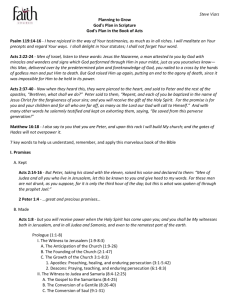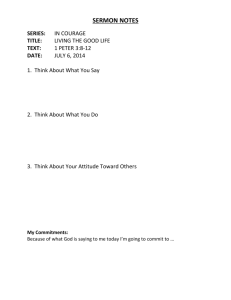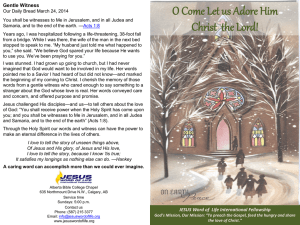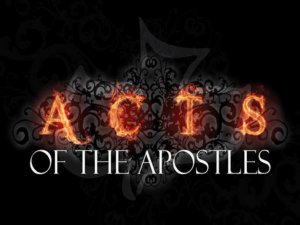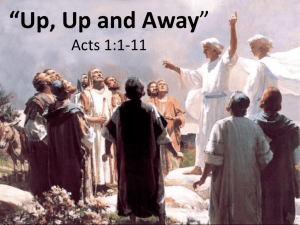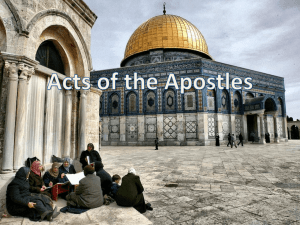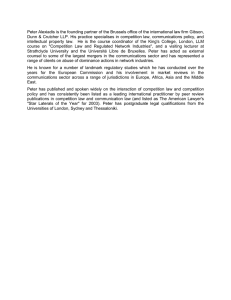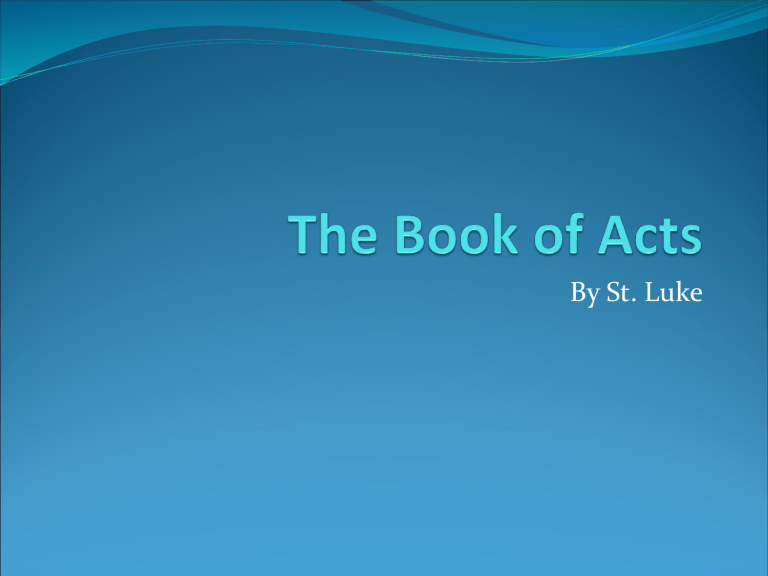
By St. Luke The Great Commission Jesus last recorded words have come to be known as the “Great Commission”: “You shall be witnesses to Me in Jerusalem, and in all Judea and Samaria, and to the end of the earth” (1:8). These are the basic steps of Evangelism. The Book of Acts, written by Luke, is the story of men and women who took that commission seriously and began to spread the news of a risen Savior to the most remote corners of the world. All available Greek manuscripts designate it by the title “Praxeis”, a word that was commonly used in Greek literature to summarize the accomplishments of outstanding men. Book of Acts While there are four accounts of the life of Jesus, this is the only book that carries on the story from his ascension to the period of the New Testament epistles. Thus Acts is the historical link between the Gospels and the Epistles. Because of Luke’s strong emphasis on the ministry of the Holy Spirit, this book could be regarded as “the acts of the Spirit of Christ working in and through the Apostles”. From a theological standpoint, Acts was written to trace the development of the body of Christ over the onegeneration transition from a primarily Jewish to a predominantly Gentile membership. This work presents Christianity as distinct from Judaism but also as its fulfillment. Book of acts Acts is a pivotal book of transitions: From the Gospels to the Epistles (history), From Judaism to Christianity (religion), From law to grace (divine dealing), From Jews alone to Jews and Gentiles (people of God), and From kingdom to church (program of God). While the apostles are mentioned collectively at several points, this book really records the acts of Peter (1-12), and of Paul (13-28). Survey of Acts Focus Witness in Jerusalem Witness in Judea and Samaria Witness to the remotest part of the earth Reference 1-7 8-12 13-28 Division Beginning and growth of the NT church Expansion of the church Paul’s 3 missionary trips and his trials Topic Jews Samaritans Gentiles Main character Peter Peter and Philip Paul Time 2 years (A.D. 33-35) 13 years (A.D. 3548) 14 years (A.D. 4862) 1. Witness in Jerusalem (1-7) The birth and progress of church After appearing to His disciples for 40 days (1:3), the Lord told them to wait in Jerusalem for the fulfillment of His promise concerning the Holy Spirit. While waiting for the promise, Peter suggested replacing Judas and Matthias was appointed after praying and casting the lots. Ten days after His ascension, His promise was significantly fulfilled as the disciples were empowered and filled with the Holy Spirit. Chapter 2 records the earth-changing events of the Day of Pentecost. The Spirit transformed a small group of fearful men into a thriving, worldwide church that is ever moving forward and fulfilling the Great Commission. The disciples were filled with courage to proclaim the brand-new message of the resurrected Savior. 1. Witness in Jerusalem (1-7) [cont.] Peter’s powerful sermon, like all the sermons in Acts, is built upon the resurrection, and 3000 persons respond with saving faith. After dramatically healing a man who was lame from birth (Chapter 3), Peter delivers a second crucial message to the people of Israel resulting in thousands of additional believers. In chapter 4, the religious leaders arrest the apostles (Peter and John) and this gives Peter the opportunity to preach a special sermon to them. After release, they all prayed for Boldness. In the same chapter, the pattern of unity and voluntary sharing in the early church is apparent “Now the multitude of those who believed were of one heart and one soul; neither did anyone say that any of the things he possessed was his own, but they had all things in common. And with great power the apostles gave witness to the resurrection of the Lord Jesus. And great grace was upon them all”. 1. Witness in Jerusalem (1-7) [cont.] The enthusiasm and joy of the infant church are marred by internal and external problems (chapters 5-7): a) Ananias and Sapphira receive the ultimate form of discipline because of their treachery and lying to the Holy Spirit. B) The apostles are imprisoned and persecuted because of their witness “But at night an angel of the Lord opened the prison doors and brought them out, and said, “Go, stand in the temple and speak to the people all the words of this life.” They went out to preach in the Temple on the next day, only to be captured again and tried. Then Peter said his famous saying “: “We ought to obey God rather than men.” The apostles were beaten up and then released “rejoicing that they were counted worthy to suffer shame for His name. 42 And daily in the temple, and in every house, they did not cease teaching and preaching Jesus as the Christ. “ 1. Witness in Jerusalem (1-7) [cont.] C) “Now in those days, when the number of the disciples was multiplying, there arose a complaint against the Hebrews by the Hellenists, because their widows were neglected in the daily distribution. 2 Then the twelve summoned the multitude of the disciples and said, “It is not desirable that we should leave the word of God and serve tables”. Therefore, 7 deacons including Stephen and Philip, were selected to assist the apostles (delegation). d) Stephen is brought before the Sanhedrin; in his defense, Stephen surveyed the scriptures to prove that the Man they condemned and killed was the Messiah Himself. The members of the Sanhedrin reacted to Stephen’s words by dragging him out of the city and making him the first Christian martyr. 2. Witness in Judea and Samaria (8-12) The Samaritans were half-breeds, descended from Israelites in the Northern Kingdom who intermarried with the Gentile settlers brought into Palestine by the Assyrians after the fall of Samaria (northern kingdom) in 722 B.C. The Jews hated the Samaritans. 2. Witness in Judea and Samaria (8-12) [cont.] Philip goes to the province of Samaria and successfully proclaims the new message to a people hated by the Jews. Peter and John confirm his work and exercise their apostolic authority by imparting the Holy Spirit to these new members of Christ [chapter 8] Simon the Sorcerer believes and offers money to the apostles to give him the power to impart the Holy Spirit by the laying of hands which made Peter rebuke him “the gift of God cannot be purchased by money”. Philip witnesses to the Ethiopian treasurer and baptizes him. 2. Witness in Judea and Samaria (8-12) [8-12] God sovereignly transforms Saul the persecutor into Paul the apostle to the Gentiles. Paul started right away by preaching in Damascus after he restored his sight at the hands of Ananias. The Jews plotted to kill him and he was sent to Jerusalem where he preached, after being introduced by Barnabas, but the Jews planned to kill him, so he was sent to Tarsus [chapter 9]. Peter heals a paralyzed man and raises Dorcas who was full of good works and charitable deeds. 2. Witness in Judea and Samaria (8-12) [cont.] Even though Paul is the apostle to the Gentiles, God used Peter to introduce the gospel to the Gentiles [chapter 10]. In a special vision Peter realizes that Christ has broken down the barrier between the Jews and the Gentiles. Cornelius the centurion in Caesarea, his family and other Gentiles accepted Christ through Peter’s teaching. 2. Witness in Judea and Samaria (8-12) [cont.] In chapter 11, Peter defends his ministry to the Gentiles and convinces the Jewish believers in Jerusalem that “the Gentiles had also received the word of God”. Persecution that arose over Stephen was a blessing to the church as those who were scattered after the persecution traveled as far as Phoenicia, Cyprus, and Antioch preaching the word. The church in Jerusalem sent out Barnabas as far as Antioch. He was glad having seen the Grace of God. Barnabas went to Tarsus to recruit Saul. He brought him to Antioch and preached there for a whole year after which they went to Jerusalem to take donations to the church in Jerusalem because of the famine in those days. The disciples were first called Christians in Antioch. 2. Witness in Judea and Samaria (8-12) [cont.] King Herod waves persecution against the church killing James and putting Peter in prison, but constant prayer was offered to God for him by the church. Peter was miraculously released from prison by an angel of the Lord. This section ends by the frightening death of Herod, being eaten by worms, as he did not give glory to God. Hence came the dictum “if someone wants to commit suicide let him harass the church”.
